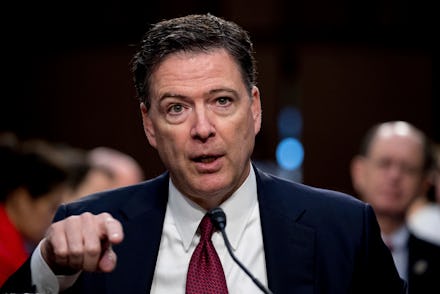Trump may have already obstructed justice enough to be impeached

Even before former FBI Director James Comey's explosive congressional testimony on Thursday, politicians and experts on both sides of the aisle were floating the idea of impeachment.
But after Comey's damning claims about the President pressuring him behind closed doors to end the FBI's investigation into former National Security Advisor Michael Flynn, the questions are swirling about whether or not the president obstructed justice by interfering with the FBI investigation and whether or not he could be charged.
Joseph A. Bondy, a criminal defense lawyer in New York who is not involved with the investigation or hearing, was circumspect about the possibility of an obstruction of justice charge.
"For somebody to be convicted under the obstruction of justice statute, one would have to show by proof beyond a reasonable doubt, a really, really high standard, that there had been either a corrupt attempt to [persuade] or obstruct not a judicial proceeding, but here an investigation of a federal agency — the FBI." Bondy said. "Or that there had been some threats in behavior or communication, or some forcible suasion to get a person to act."
Bondy didn't rule out the idea that Trump could have committed obstruction of justice, but thinks more evidence is needed. "I think if there’s a takeaway from today, it's that the facts are still evolving and unfolding." Bondy said. "That there are two sides to this coin, and that for an obstruction of justice case to be proven, you have to really be able to demonstrate not just your subjective belief, but rather that is what the actor or defendant intended to do."
But when it comes to crimes committed by the president and the possibility of impeachment, traditional legal standards (like the ones Bondy described) may not be as important as what Congress thinks about the President and his actions.
Allan Lichtman, a professor of history at American University in Washington, D.C., notes that, while criminal statutes about obstruction of justice may be key to the investigation by special counsel Robert Mueller, the bar is much lower if the House of Representatives decides to bring articles of impeachment against this president.
"A special counsel or prosecutor deals with criminal charges. A House impeachment inquiry goes beyond criminal charges to consider abuses of presidential power." Lichtman said, "And the framers made it very clear that was not limited to criminal activity."
Lichtman, who is the author of the new book The Case for Impeachment, had made his position on Trump's impeachment clear long before Thursday's hearing. But, after the hearing, he thinks impeachment on the grounds of obstruction of justice is closer than ever.
"I think the case now, not only when you consider the Comey testimony but many other incidents, creates a case for obstruction of justice as strong, or stronger, than the case for obstruction against Bill Clinton," Lichtman said. "And it's on a matter vastly more serious than [concealing] a private consensual affair." (Bill Clinton was impeached on two counts, perjury and obstruction of justice, by the House after he misled special prosecutor Kenneth Starr in the inquiry into Whitewater. He was acquitted on both charges by the Senate.)
Lichtman also noted that the nation's first president to ever be impeached, Andrew Johnson in 1868, was not charged with violating criminal law, but civil law. "And if there is an impeachment inquiry by the House, it's not limited to [obstruction of justice]. The House could range into any potentially impeachable offense, including violation of the emoluments clause," Lichtman said, referencing concerns by ethics experts that Trump's refusal to completely decouple himself and his family from his business may violate longstanding conflict of interest laws.
Though Lichtman recognizes that impeachment remains politically unlikely at this time, he believes that Republicans could turn on Trump as things continue to unravel. "Congress is like Wall Street: It runs on fear and greed," Lichtman said, "And, if Republicans become fearful enough that the president is a drag on the Republican party — and, more pointedly, a drag on their re-election in 2018 — they could well turn against this president."